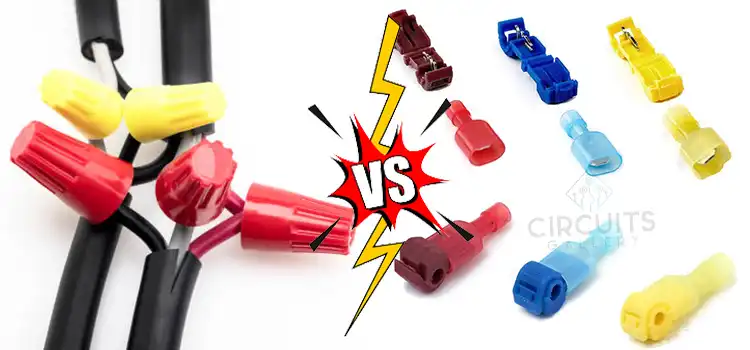Wire Nuts vs Crimp Connectors | Comparison For Optimal Connection
Wire nuts are easy to install, readily available, and affordable. They provide a secure connection, making them a popular choice for many electrical projects.
Crimp connectors offer exceptional reliability and durability. They create a strong, vibration-resistant connection, making them the preferred choice for critical applications.
Here on we will be assisting you in making an informed decision that aligns with your specific electrical needs.

Navigating Choices: Between Wire Nuts and Crimp Connectors
When choosing between wire nuts and crimp connectors, several factors come into play.
Construction and Functions
Wire nuts are essential components in the world of electrical wiring. They are designed to serve a critical purpose: joining electrical wires together securely and reliably. Wire nuts consist of a plastic cap with an internal spring-loaded mechanism that holds the wires tightly when they are twisted together.
Crimp connectors are metal sleeves used to join wires by crimping or squeezing them together. These connectors are available in various materials, including copper and aluminium.
Available Types
Wire nuts come in various sizes and configurations to accommodate different wire gauges and combinations. Common types include winged wire nuts, closed-end wire nuts, and twist-on connectors for specific applications.
Crimp connectors encompass an extensive range, such as butt connectors, ring terminals, spade connectors, and more. Each type is suited to specific applications and wire combinations.
When To Use
Wire nuts are suitable for a wide range of applications, including household wiring, connecting fixtures, and junction boxes. They are beneficial for DIY enthusiasts and residential electricians.
Crimp connectors find their niche in applications that demand a reliable and long-lasting connection. They are commonly used in automotive, marine, and aerospace settings, where vibration and environmental factors are significant concerns.
Ease of Installation
Wire nuts are generally easier to install, making them a go-to choice for DIY projects. Crimp connectors require specialized tools for proper installation, which can be a deterrent for some users.
Reliability
Crimp connectors excel in terms of reliability, especially in applications where a stable connection is crucial. Wire nuts are reliable for most residential and light commercial applications but may not be suitable for highly demanding situations.
Durability
Crimp connectors outshine wire nuts in durability. They resist vibration and environmental factors, ensuring a long-lasting connection. Wire nuts are less durable and may require occasional inspection and tightening.
Cost-effectiveness
Wire nuts are more cost-effective for smaller projects, while crimp connectors may have a higher upfront cost due to the tools required. However, for long-term, critical applications, crimp connectors may prove more cost-effective.
Applications of Wire Nuts
Household Wiring: Wire nuts are commonly used for connecting wires in residential electrical systems, such as outlets, switches, and lighting fixtures.
Electrical Fixtures: They are ideal for connecting wires in electrical fixtures like ceiling fans, chandeliers, and pendant lights.
Junction Boxes: Wire nuts are often employed to join wires inside electrical junction boxes.
Applications of Crimp Connectors
Automotive Wiring: Crimp connectors are frequently used in automotive wiring, providing a secure and durable connection in a high-vibration environment.
Marine and Aerospace: In harsh environments, such as marine and aerospace settings, crimp connectors are indispensable for their robust and reliable performance.
Industrial Machinery: Crimp connectors are commonly used in industrial machinery where a dependable electrical connection is crucial.
The Pros and Cons of Wire Nuts
| Pros | Cons |
| Easy to installCost-effectiveSuitable for residential applicationsReadily available | May require occasional tighteningLess durable in high-vibration environments |
The Pros and Cons of Crimp Connectors
| Pros | Cons |
| Exceptional reliabilityHigh durabilityIdeal for critical applicationsVibration-resistant | Require specialized toolsHigher upfront cost |
Relevant Questions
Can I Use Wire Nuts in My Car’s Electrical System?
While wire nuts can be used in certain automotive applications, crimp connectors are often a better choice for their durability.
Are There Specific Safety Precautions I Should Take When Using Crimp Connectors?
When using crimp connectors, ensure you have the appropriate tools and follow safety guidelines to prevent injuries or damage to the wires.
Can I Reuse Wire Nuts and Crimp Connectors?
While wire nuts can be reused in some cases, crimp connectors are typically intended for one-time use. Always refer to manufacturer guidelines.
Are There Any Environmental Considerations When Choosing between Wire Nuts and Crimp Connectors?
Crimp connectors are more suitable for applications in harsh environments, such as marine or aerospace, where wires are exposed to moisture and extreme conditions.
Can I Use Crimp Connectors for Low-Voltage Applications like Data or Telecommunications Cabling?
Crimp connectors are versatile and can be used for low-voltage applications, providing a secure connection.
Conclusion
Between wire nuts and crimp connectors, consider wire nuts for affordability and simplicity in residential settings. But if you prioritize durability, and versatility, and are willing to invest more initially, crimp connectors might be the optimal choice. Make your choice wisely by considering the project specifics, budget, and recommendations of professionals in the field.
Subscribe to our newsletter
& plug into
the world of circuits